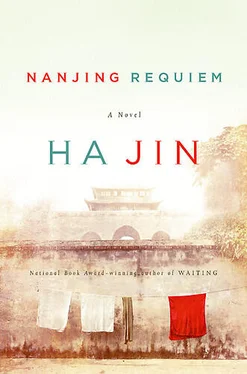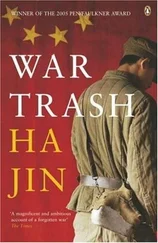IN RECENT MONTHS the local Red Swastika Society, “the Society of Dao and Virtue,” had been active in relief work. A Chinese private charity organization formed in the early 1920s and grounded in Daoism and Buddhism, it now had millions of members all over the world. The society’s philanthropic efforts had reached the Soviet Union and Japan (after earthquakes), and it had offices in Tokyo, London, and Paris. It urged its members to learn Esperanto. Lately its Nanjing branch had become a main workforce coordinated by the International Relief Committee, which had been established to replace the Safety Zone Committee in mid-March. The local Red Swastika had admitted hundreds of new members and was occupied with burial work. Every member of the society wore a large swastika at the center of his chest when doing his job. The emblem was a Buddhist symbol, the arms of its cross bent left instead of right, and it had nothing to do with the Nazis, but some Japanese soldiers seemed to associate it with Germany and treated these Chinese workers with a little courtesy. To endure the overpowering stench of decaying bodies, many of the men drank cheap liquor before they set about their detail, usually four or five as a team. If possible, they would burn a sheaf of sacrificial paper, donated by some temples, for the dead, especially for the old. In most cases the workers just covered the corpses with lime and a layer of earth in mass graves. According to its records, which Minnie and I had seen on our visit to the main office, from the middle of January to the end of March, the Red Swastika had buried 32,104 bodies, at least a third of them civilians. The men of the Advance Benevolence Society (Chong Shan Tang) had also been interring the dead. Up to early April, they had buried more than 60,000 corpses in the city and its outskirts, about twenty percent of whom were women and children. Some other organizations were also engaged in the burial work. Every week new mass graves were dug as the existent ones filled up. Yet by far the largest burial ground was the Yangtze, into which the Japanese had dumped tens of thousands of bodies.
Several times Minnie had asked the Red Swastika men to bury the dead at the pond west of our campus, but they said they were too busy picking up corpses in the city and at the major execution sites to worry about those scattered in the suburbs. Two weeks ago they’d been given permission to inter twenty thousand bodies in Hsia Gwan, and that job alone would take them more than a month, since they could bury at most seven hundred a day, bringing the corpses together and laying them away in mass graves. So not until late April did a group of workers go to the pond in the valley, collect the dead, fish some bodies out of the water, and clear that area.
At Jinling some of the young women refugees were also busy burying, not human remains but human feces — they’d been gathering all the excrement, putting it in ditches and pits, and covering it with lime. I could detect the decrease of the foul odor in the air, and the camp felt cleaner every day. I was very pleased about their work. One bright morning toward the end of April, when I ran into the leader of the feces-collecting team, a tall twentyish woman with a pair of long braids, I told her, “Take it easy. As long as you girls can bury everything in two weeks, it will be fine.”
“We want our campus to be clean and beautiful,” she replied in a clear voice.
I appreciated the possessive adjective she used—“our”—and said to her, “At the end of the day, all the girls on your team can take a shower.”
“That’s great. Thank you, Mrs. Gao.” Her eyes gleamed.
We had just put up a shower house for the refugees, who hadn’t washed for months. It was Minnie who had insisted on installing these facilities despite some opposition among the staffers. The women and girls here loved the shack, in which there were twenty-six spray nozzles along the walls. Some of them were amazed that they could adjust the temperature of the water by themselves. Yet due to the large number of refugees, one could use the facility only once every other week.
A FEW NIGHTS LATER Boom Chen, the headman of the porridge plant, was killed by bandits. His extravagant lifestyle must have convinced them that he’d stolen a large amount of the refugees’ rations, so they demanded that he share his goods with them. He denied that he had appropriated any rice and offered to help them steal our car instead. But when they snuck onto campus at night and got into the rattletrap, they couldn’t start the thing however hard they tried. They smashed the windshield and called Boom Chen names, saying he’d pay for this. They broke into his home and searched around for rice, but didn’t find any. They tied him to a chair and grilled him. He confessed he’d just sold his cache and remitted the money to his parents in Tianjin City. He promised to get two thousand pounds of rice for the bandits in the near future, but they ran out of patience and one of them plunged a knife into his chest.
That was what his wife had told us. The woman was somewhat silly and let the whole thing slip.
The camp had just received some wheat and barley, so the rice porridge, mixed with beans and the other grains, was finally thick enough for a pair of chopsticks to stand in a bowl of it, which was the conventional standard of quality porridge. Nobody griped about the meals anymore. Luhai swore up and down that it was the hand of Providence that had helped us get rid of the big rat, but for Minnie the denouement had come too late. She also said that the penalty was way too severe, because she didn’t believe in capital punishment.
In mid-May the Autonomous City Government ordered that all the refugee camps close down by the end of the month. At the same time, the Japanese embassy invited the foreigners working in the camps to dinner. At first Minnie was reluctant to go, but on second thought, she felt it might be an opportunity to exchange views with the officials and earn their sympathy. She brought a copy of the petition to the dinner in hopes of presenting it to the top diplomat there.
Consul-General Okazaki didn’t show up at the banquet, which was hosted by Tanaka and Fukuda and attended by John Allison and some American missionaries, including Minnie and Holly. Tanaka spoke about the necessity of shutting down the camps and praised the foreigners for what they’d been doing for the refugees. Minnie presented the petition to the vice-consul, who riffled through the paperwork and agreed to look into the matter. His promise was welcomed by a round of loud applause from the guests. All the camp workers among them agreed to close down the refugee camps. Minnie was grateful for her colleagues’ support, which could be viewed as a favor in return for Tanaka’s promise.
Three days later we heard from Tanaka. He said that Sufen’s son and four of the eight men identified by the women would be released from jail within a week, but the other four men, according to the prison’s files, were associated with the Chinese army and had to remain in prison. Minnie countered, “Look, our information shows that those men are completely innocent.”
“Miss Vautrin,” Tanaka said, “I’ve done my best. The prison agreed to let your women come and see whether their husbands and sons are there. I believe that more of them will be liberated.”
Minnie didn’t press him further and instead fixed a time for the women to visit the prison. Hanging up, she looked elated. I was delighted too. We hugged for half a minute.
After five months’ struggle, at last there was some progress. We hoped this might lead to the release of hundreds of men and boys. Minnie looked into Big Liu’s office to tell him the good news, but he was not there. Together we went out and strolled around campus for a while.
Читать дальше











